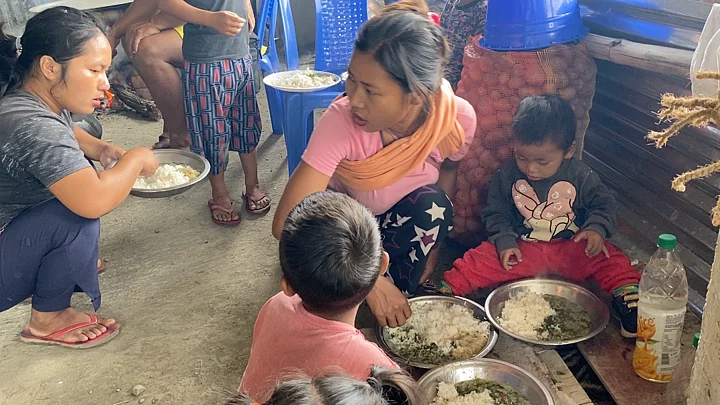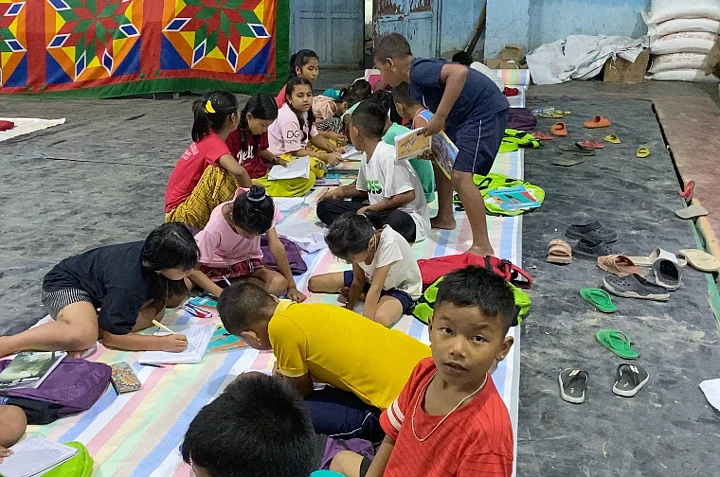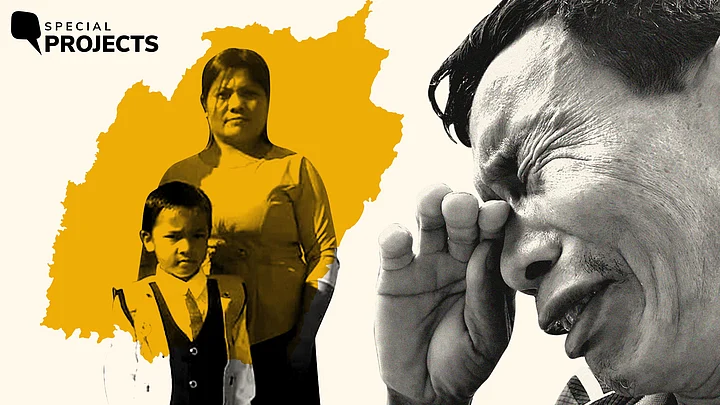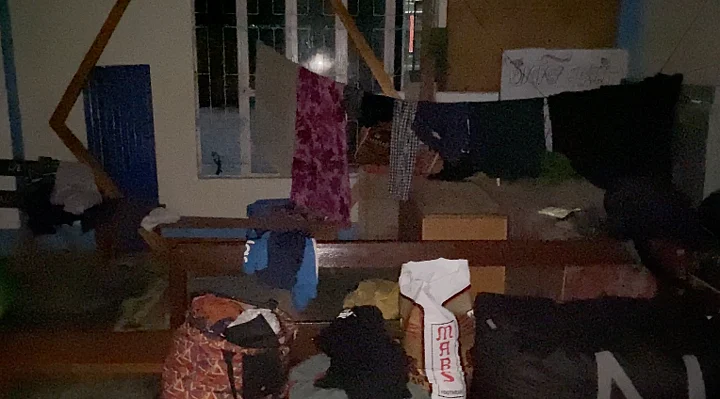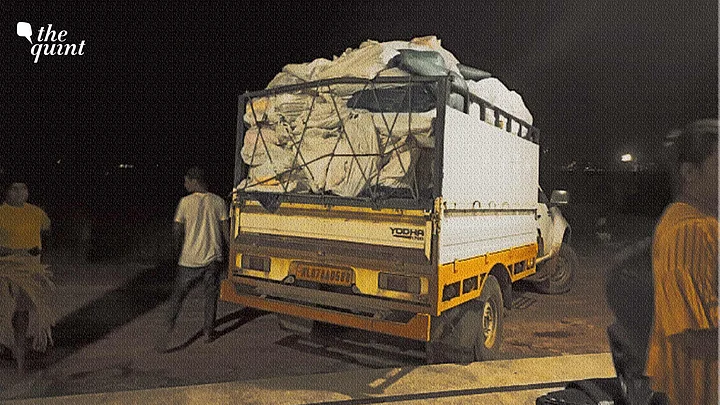It’s been 2 months.
The violence between the Meiteis and the Kukis in Manipur that erupted on 3 May refuses to cease, with more than 100 dead according to official numbers, and thousands displaced who are now surviving in relief camps.
The Quint visited some of these relief camps sheltering fleeing people from both communities across Churachandpur, Imphal, and Kangpokpi districts. This is what the people of Manipur have to say.
'We're Living Very Close to Death'
In a relief camp in Kangpokpi district, sitting in front of an abandoned construction building that serves as the dining area for internaly displaced Kukis (mostly from Imphal), a couple narrated their ordeal.
"When they (Meiteis) attacked us, we villagers tried our best to defend ourselves but we failed," said Mang (name changed), a Kuki man who was beaten up so badly that his vision is now impaired.
"I remember getting hit three times and the fourth time I lost my consciousness and fell," he added.

Mang and Lun (names changed).
(Photo: Saptarshi Basak/The Quint)
Mang's wife, Lun (name changed), went on to describe in greater detail the brutality that they had faced. "Everyone ran for their lives and escaped to a nearby Naga village, but I ran back to look for my missing husband as he had not joined the rest of us."
Mang and Lun are among the estimated 330 Kukis seeking refuge in the shelter camp that The Quint visited in a village called Saparmeina Salem. A school and its halls serve as bedrooms for those staying at the camp.
"As I ran back I found his small bag in one place and as I kept searching I found that they had removed my husband's pants and hurt him all over his body. There was a deep cut near my husband's eye and lots of blood was flowing out of the cut and there were injury marks all over him. I was so worried. I cried a lot and took this picture on my phone," Lun further narrated, trying to hold back her tears.

Injuries on Mang.
(Photo: Saptarshi Basak/The Quint)
A fellow villager had happened to pass through that road in his van and it was that vehicle in which Mang was carried to a nearby village.
"There's no one to help carry my husband around even to get into a bus It is so heartbreaking and brings me to tears all the time," Lun continued, now breaking down. "As everyone is busy with their own struggles there's no one to help me look after my husband. We really need a good hospital for my husband where a good doctor can look after him, especially after his eyes."
- 01/04
A relief camp in Kangpokpi.
(Photo: Saptarshi Basak/The Quint)

- 02/04
A relief camp in Kangpokpi.
(Photo: Saptarshi Basak/The Quint)

- 03/04
A relief camp in Kangpokpi.
(Photo: Saptarshi Basak/The Quint)

- 04/04
A relief camp in Kangpokpi.
(Photo: Saptarshi Basak/The Quint)

Describing how their lives have completely changed in the relief camp where they are taking shelter in, she said, "We are still living a life of uncertainty. There's no peace or assurance because we feel we're living very close to death. We don't even have proper clothing or even change of clothes. He (Mang) is still wearing the same clothes that had blood stains before. We came here with just one blanket. The people of Motbung provided us with some blankets. One mother provides us with food, clothes, warm water, and others. As a human, these things give us some sort of assurance but as we are still in a war-like situation."
"We still don't have complete peace. Going back to our village is unthinkable as it reminds us of our close encounter with death. We're living a very difficult life filled with fears and uncertainties."Lun (name changed)
'But I Still Love Them...'
In Imphal, the capital of Manipur, a relief camp has become a school for young children. The Quint visited the Akampat relief camp to know more about the plight of Meiteis escaping the violence in Kuki-dominated areas like Moreh and Churachandpur.
One Meitei who escaped such an area is N Samananda.
"They destroyed our houses in Moreh. Our whole village was burnt by Kuki militants. After burning our houses, they threatened to kill us and drove us away. All my income and my business, everything is finished," the 35-year-old man told The Quint. "We want to go back to Moreh and live in peace," he added.

N Samananda, a Meitei who fled Moreh, in Akampat relief camp, Imphal.
(Photo: Saptarshi Basak/The Quint)
N Samananda did make a distinction between what he called an 'indigenous Kuki' and a 'Burmese Kuki'."The indigenous Kuki understands our pain, but the Burmese ones don’t understand. We can’t live them. They ask for a separate administration, but that includes Naga territory too. What will the Nagas say? They are saying that Naga's and Meitei's area is theirs. Is this possible? It’s not possible."
A 27-year-old woman who gies by the name 'Baby' explained to The Quint her role as a teacher in the relief camp. "There are lots of children staying here. This particular relief camp has given me the opportunity to educate children. Since I worked as a teacher in Churachandpur, I help educate the students here. I am an English teacher, so I teach them English. I just teach what I know," she said, breaking into a shy smile, an expression that turns into dejection as soon as she is asked about her Kuki friends.
"I have lots of Kuki friends since I was brought up there (Churachandpur). And I still love them. Some of them, yes, they really betrayed us, but I still love them," Baby lamented.

Baby, a Meitei who fled Churachandpur in Akampat relief camp, Imphal.
(Photo: Saptarshi Basak/The Quint)
- 01/03
Akampat relief camp in Imphal.
(Photo: Saptarshi Basak/The Quint)

- 02/03
Akampat relief camp in Imphal.
(Photo: Saptarshi Basak/The Quint)

- 03/03
Akampat relief camp in Imphal.
(Photo: Saptarshi Basak/The Quint)

'Please Consider Our Suffering'
In Churachandur, as the sun was setting, The Quint visited a camp that had been devoid of electricity all day. That is not unusual, say the inhabitants of the camp, who are living in a setting that is cramped and limited in essential resources like water, power, and medicines.
As the Kukis taking shelter in the camp gathered around and sat together, one woman, on the condition of anonymity, stepped forth to describe what her entire village had gone through since 3 May.
"On 3 May, they (Meiteis) came to attack P Khonomphai village around 6 in the evening. We hadn’t yet taken our evening meal, our children were also playing around in the village when they came carrying guns, sticks, and big knives with the intention of slaughtering all of us in the village. Even my elder brother was brutally beaten and left to die on that day. They came in the evening and burned all our houses. We were not able to take any of our clothes or money and they burnt all our granaries as well. All of our family members got separated. They even killed my uncle. This is how they terrorised us. Oh, how painful it is…"
- 01/04
A relief camp in Churachandpur. The camp had not received electricity all day and the interior was close to pitch dark when The Quint visited.
(Photo: Saptarshi Basak/The Quint)

- 02/04
A relief camp in Churachandpur. The camp had not received electricity all day and the interior was close to pitch dark when The Quint visited.
(Photo: Saptarshi Basak/The Quint)

- 03/04
A relief camp in Churachandpur. The camp had not received electricity all day and the interior was close to pitch dark when The Quint visited.
(Photo: Saptarshi Basak/The Quint)

- 04/04
A relief camp in Churachandpur. The camp had not received electricity all day and the interior was close to pitch dark when The Quint visited.
(Photo: Saptarshi Basak/The Quint)

She further described how dozens of them fled to the mountains, including people with disabilities. Her niece is blind. People like them had to be carried, she claimed. "There were also old and sick people amongst us, we had to also carry my own grandmother up the hills. When we were resting on the mountain, we heard gunshots again, so we climbed back down to a nearby village called Wakonphai and hid there."
Unable to keep her emotions together, the woman makes a visibly urgent appeal: "We do not want to suffer like this anymore. Our leaders in different positions, please look at our situation. We do not have a place to sleep peacefully, and we are barely able to meet our basic needs. Even now, we eat if we are provided for, and starve when there are not enough supplies. What is going to happen to us? Please look at us and consider our suffering."
(At The Quint, we question everything. Play an active role in shaping our journalism by becoming a member today.)



